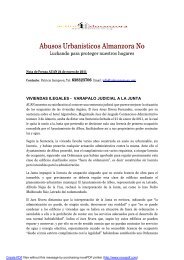European Property Rights and Wrongs - Diana Wallis MEP
European Property Rights and Wrongs - Diana Wallis MEP
European Property Rights and Wrongs - Diana Wallis MEP
You also want an ePaper? Increase the reach of your titles
YUMPU automatically turns print PDFs into web optimized ePapers that Google loves.
3) the EU Charter plays a role in this process as being the ultimate EU yardstick for<br />
the application of the freedom of persons, services, goods <strong>and</strong> capital. The right<br />
to property is protected by article 17 (1) of the Charter: “Everyone has the right<br />
to own, use, dispose of <strong>and</strong> bequeath his or her lawfully acquired possessions.<br />
No one may be deprived of his or her possessions, except in the public interest<br />
<strong>and</strong> in the cases <strong>and</strong> under the conditions provided for by law, subject to fair<br />
compensation being paid in good time for their loss. The use of property may be<br />
regulated by law in so far as is necessary for the general interest.” Article 17 is<br />
clearly inspired by Article 1 of the First Protocol to the <strong>European</strong> Convention on<br />
Human <strong>Rights</strong>. Case law developed by the <strong>European</strong> Court of Human <strong>Rights</strong> will<br />
therefore be a benchmark for how the CJEU will interpret article 17. 35<br />
Focussing on this negative integration process, resulting from the impact<br />
of fundamental human rights, I will now make some remarks, first of all, on<br />
cross-border acquisition of immovable property <strong>and</strong> the negative effects which<br />
unknown public law limitations may have, which has become a serious problem<br />
for home owners in Spain. Secondly, I will make some remarks on the protection<br />
of pension rights, a problem which is bound to arise in the wake of the present<br />
financial crisis <strong>and</strong> the resulting austerity measures.<br />
Cross-border acquisition of immovable property<br />
More <strong>and</strong> more frequently, citizens from Member States use their freedom of establishment,<br />
as laid down in article 49 ff. TFEU <strong>and</strong> their rights as EU citizens laid<br />
down in articles 18 ff. TFEU. To make this even more explicit, let me quote article<br />
20 (2): “Citizens of the Union shall enjoy the rights <strong>and</strong> be subject to the duties<br />
provided for in the Treaties. They shall have, inter alia: (a) the right to move <strong>and</strong><br />
reside freely within the territory of the Member States (…)”. An essential aspect<br />
of establishment is renting or acquiring a home. Following the generally applied<br />
rule “lex rei sitae”, acquiring home ownership is governed by the law of the country<br />
where the home is located. I use the term “ownership” in a broad functional<br />
35 A recent summary of ECHR case law (in Dutch) was given by B. Akkermans, Artikel 1<br />
Eerste Protocol EVRM, in: J.H. Gerards, A.W. Heringa, H.L. Jansen <strong>and</strong> J. van der Velde<br />
(eds.), EVRM Rechtspraak en Commentaar inclusief EHRC, 2011 (Article 1 First Protocol<br />
ECHR, in: ECHR Case Law <strong>and</strong> Comments, including the Commission on Human <strong>Rights</strong>)<br />
(The Hague: SDU Uitgevers, loose leaf edition).<br />
46<br />
A <strong>European</strong> L<strong>and</strong> Law?



